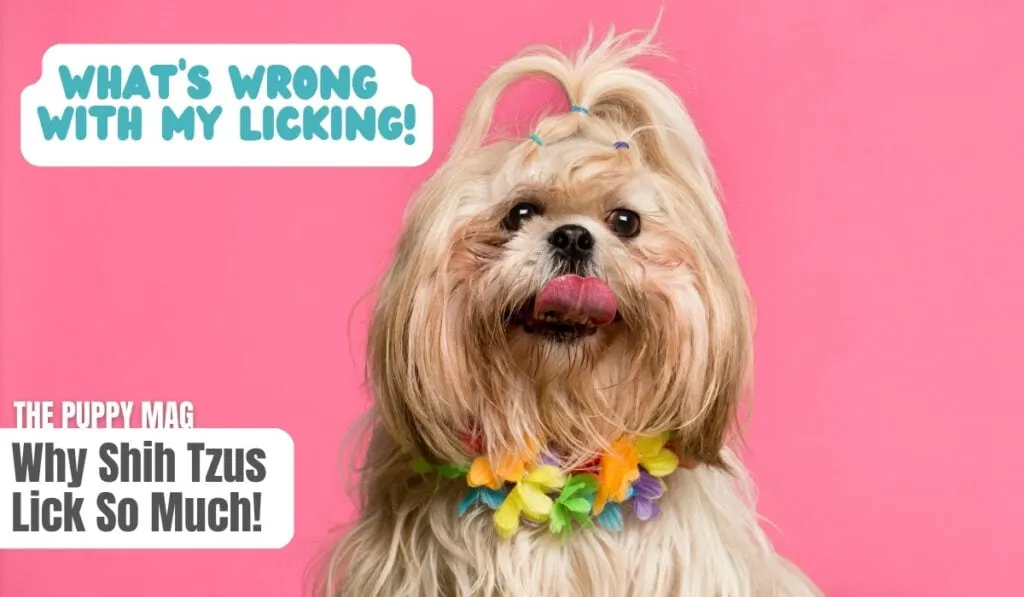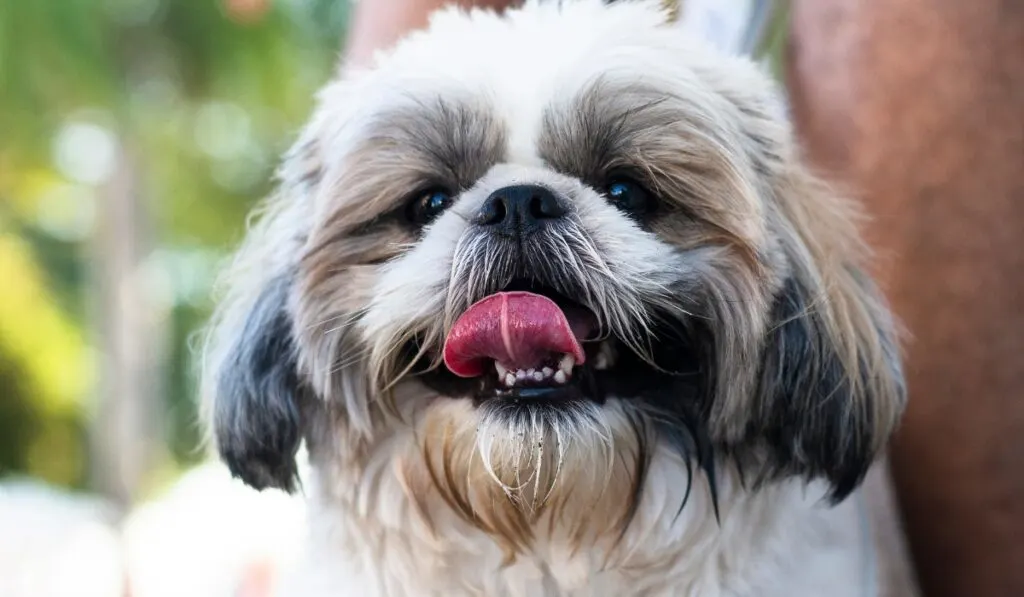If you’re a Shih Tzu owner like me, you’ve probably noticed your furry friend spends quite a bit of time licking themselves, you, or other objects around the house.
While a certain amount of licking is normal for all dogs, excessive licking can be a sign of an underlying issue.
In this article, I’ll go over the top reasons why your Shih Tzu might be licking so much and how to address this behavior.

6 Reasons Why Your Shih Tzu Licks (in general)
Let’s first run through the main reasons why Shih Tzus lick so much, in general. I’ll include information about why your Shih Tzu might be licking you in a section below.
- Grooming and cleanliness
- Allergies or skin irritations
- Anxiety or stress
- Boredom or lack of mental stimulation
- Medical issues
- Attention-seeking behavior
1. Grooming and Cleanliness
Just like cats, dogs also groom themselves to stay clean. Shih Tzus are no exception. Their long, silky coats can easily collect dirt and debris, so they may resort to licking as a way to keep themselves clean. This can be especially true if your Shih Tzu is prone to eye discharge, which can accumulate in the fur around their eyes.
- Regular grooming can help reduce your dog’s need to lick for cleanliness. Brush your Shih Tzu daily to remove loose hair and debris, and consider scheduling regular grooming appointments to keep their coat in top shape.
- Make sure to clean the area around their eyes gently with a damp cloth or pet-specific eye wipes to remove any discharge.
2. Allergies or Skin Irritations
Excessive licking can sometimes be a sign that your Shih Tzu is dealing with allergies or skin irritations. Common allergens for dogs include pollen, grass, certain foods, and household chemicals. Licking can help relieve itchiness and discomfort caused by these irritations.
According to the AKC, some common signs of allergies in dogs include:
- Red, inflamed skin
- Frequent scratching or chewing at the skin
- Hair loss
- Ear infections
If you suspect your Shih Tzu is licking due to allergies, you should consult your veterinarian. They can help determine the cause of the allergies and recommend an appropriate treatment plan. In the meantime, you can try:
- Switching to a hypoallergenic diet to rule out food allergies
- Using gentle, fragrance-free shampoos and grooming products
- Regularly washing your dog’s bedding and toys to remove allergens

3. Anxiety or Stress
Dogs, including Shih Tzus, may resort to excessive licking as a coping mechanism for anxiety or stress. This behavior can be a form of self-soothing, similar to how humans might chew on their nails or tap their feet when feeling nervous. It’s important to identify the cause of your dog’s stress and work on addressing it to prevent long-term licking habits.
Some possible sources of anxiety in dogs, as mentioned by Vetstreet, are:
- Separation anxiety
- Changes in routine or environment
- Loud noises (e.g., thunderstorms, fireworks)
- Other pets or people in the home
To help your Shih Tzu cope with anxiety or stress, consider trying the following:
- Providing a safe, quiet space for them to retreat to when they’re feeling overwhelmed
- Establishing a consistent daily routine
- Using positive reinforcement training to build their confidence
- Consulting with a professional dog trainer or behaviorist for additional support
4. Boredom or Lack of Mental Stimulation
When your Shih Tzu doesn’t have enough mental stimulation, they may resort to licking as a way to pass the time. To keep your dog entertained and engaged, make sure to provide plenty of physical exercise and mental stimulation.
Here are some tips to help alleviate boredom:
- Go for daily walks, adjusting the length and intensity based on your dog’s energy levels and abilities
- Offer interactive toys and puzzle feeders to challenge your dog’s brain
- Teach your Shih Tzu new tricks or commands using positive reinforcement training
- Schedule regular playdates with other dogs to provide social interaction
Remember that a tired and mentally stimulated dog is less likely to engage in excessive licking or other undesirable behaviors.
5. Medical Issues
Sometimes, excessive licking can be a symptom of an underlying medical issue. Conditions like dental problems, gastrointestinal issues, or even arthritis can lead to discomfort and cause your Shih Tzu to lick themselves more than usual.
If your dog’s licking seems to be focused on a specific area, such as their paws, joints, or abdomen, it’s essential to consult with your veterinarian. They can perform a thorough examination to determine if there’s an underlying medical issue causing the behavior. If a medical problem is identified, your vet will recommend an appropriate treatment plan to address the issue and help your dog feel better.
6. Attention-Seeking Behavior
Our dogs are smart, and they quickly learn that certain behaviors can get them the attention they crave. If you tend to give your Shih Tzu attention when they lick – whether it’s positive or negative attention – they may continue to lick as a way to interact with you.
To discourage attention-seeking licking, try the following:
- Ignore the licking behavior and avoid giving your dog any attention when they lick
- Praise and reward your Shih Tzu when they’re engaging in more appropriate behaviors, like sitting quietly or playing with their toys
- Offer affection and attention to your dog on your terms, not when they demand it through licking
How to Stop Excessive Licking
Now that we’ve gone over some of the main reasons why your Shih Tzu may be licking so much, let’s discuss some general strategies to help curb this behavior:
- Identify the cause: Before you can effectively address your dog’s licking, you need to determine the underlying cause. Observe your Shih Tzu closely and take note of any patterns or triggers that may be causing the licking.
- Consult your veterinarian: If you suspect your dog’s licking is due to a medical issue or allergy, it’s important to consult with your vet for a proper diagnosis and treatment plan.
- Positive reinforcement training: Teach your Shih Tzu the “leave it” command or redirect them to a more appropriate behavior, like playing with a toy, when they start licking. Always reward and praise them when they stop licking and engage in the desired behavior.
- Prevent boredom and stress: Ensure your dog is getting enough mental and physical stimulation, and address any sources of stress or anxiety in their environment.
Why Your Shih Tzu Licks You (or others)
Another reason your Shih Tzu may be licking you so much is that they’re trying to show their affection and strengthen the social bond between you.
Licking is a natural behavior in dogs that dates back to their wild ancestors. Puppies lick their mothers to solicit food and attention, while adult dogs may lick each other as a sign of submission or to maintain social bonds.
When your Shih Tzu licks you, they could be expressing their love and trust in you as a member of their “pack.”
To better understand why your Shih Tzu may be licking you excessively, consider these factors:
- Comfort and security: Your dog may associate licking you with feelings of comfort and safety. They could be trying to show you that they trust you and feel secure in your presence.
- Taste: Sometimes, dogs simply enjoy the taste of their owner’s skin. Our skin can have traces of sweat, lotions, or other substances that might be appealing to your Shih Tzu’s taste buds.
- Reinforcement: If you respond positively to your dog’s licking, such as giving them attention, petting, or talking to them, you might be reinforcing the behavior. Your Shih Tzu learns that licking you results in attention, so they continue to do it.
While it’s perfectly normal for your Shih Tzu to lick you occasionally as a sign of affection, excessive licking can be problematic. If you’d like to curb this behavior, here are some tips:
- Set boundaries: Teach your Shih Tzu that it’s not always appropriate to lick you. You can use the “leave it” command or gently remove your hand when they start licking. Be consistent in your response, so they understand that licking you excessively is not acceptable.
- Redirect the behavior: When your Shih Tzu begins to lick you, redirect their attention to a more appropriate activity, such as playing with a toy or chewing on a treat.
- Avoid reinforcing the behavior: Be mindful of your reaction to your dog’s licking. If you tend to give them attention or rewards when they lick, they’ll be more likely to continue the behavior. Instead, reward your Shih Tzu when they’re calm and not licking you.
- Offer alternative forms of affection: Make sure your Shih Tzu is receiving plenty of love and attention from you in other ways, such as cuddling, petting, and playing. This can help satisfy their need for social bonding without resorting to excessive licking.
By understanding the various reasons behind your Shih Tzu’s licking behavior, including their natural instinct to show affection and strengthen social bonds, you can take appropriate steps to manage and redirect this behavior.
Closing thoughts
In conclusion, excessive licking in Shih Tzus can be caused by various factors, from grooming habits and allergies to anxiety and boredom.
By identifying the root cause and working with your veterinarian or a professional dog trainer, you can help your Shih Tzu live a happier, healthier life with less licking.
Remember to consult trusted sources like the AKC (www.akc.org) and Vetstreet (www.vetstreet.com) for more information on understanding and addressing your dog’s behavior.
